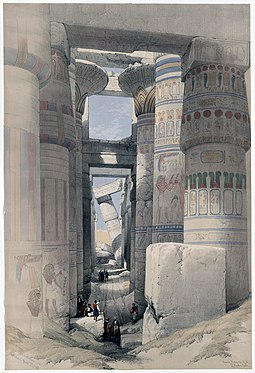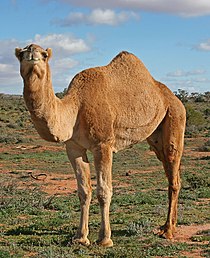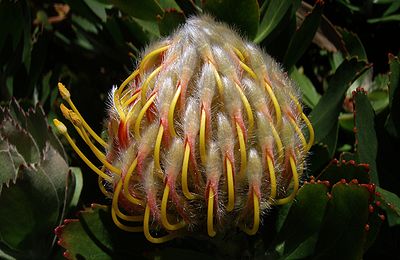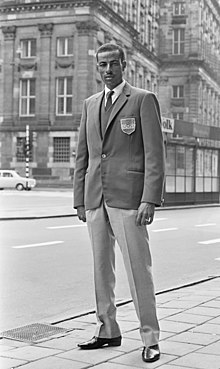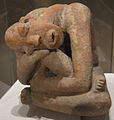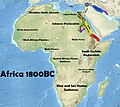Portal:Africa



Africa is the world's second largest and second-most populous continent after Asia. At about 30.3 million km2 (11.7 million square miles) including adjacent islands, it covers 20% of Earth's land area and 6% of its total surface area. With 1.4 billion people0 as of 2021, it accounts for about 18% of the world's human population. Africa's population is the youngest amongst all the continents; the median age in 2012 was 19.7, when the worldwide median age was 30.4. Despite a wide range of natural resources, Africa is the least wealthy continent per capita and second-least wealthy by total wealth, ahead of Oceania. Scholars have attributed this to different factors including geography, climate, tribalism, colonialism, the Cold War, neocolonialism, lack of democracy, and corruption. Despite this low concentration of wealth, recent economic expansion and the large and young population make Africa an important economic market in the broader global context.
Africa straddles the equator and the prime meridian. It is the only continent to stretch from the northern temperate to the southern temperate zones. The majority of the continent and its countries are in the Northern Hemisphere, with a substantial portion and a number of countries in the Southern Hemisphere. Most of the continent lies in the tropics, except for a large part of Western Sahara, Algeria, Libya and Egypt, the northern tip of Mauritania, and the entire territories of Morocco, Ceuta, Melilla, and Tunisia which in turn are located above the tropic of Cancer, in the northern temperate zone. In the other extreme of the continent, southern Namibia, southern Botswana, great parts of South Africa, the entire territories of Lesotho and Eswatini and the southern tips of Mozambique and Madagascar are located below the tropic of Capricorn, in the southern temperate zone.
Africa is highly biodiverse; it is the continent with the largest number of megafauna species, as it was least affected by the extinction of the Pleistocene megafauna. However, Africa also is heavily affected by a wide range of environmental issues, including desertification, deforestation, water scarcity and pollution. These entrenched environmental concerns are expected to worsen as climate change impacts Africa. The UN Intergovernmental Panel on Climate Change has identified Africa as the continent most vulnerable to climate change.
The history of Africa is long, complex, and has often been under-appreciated by the global historical community. Africa, particularly Eastern Africa, is widely accepted as the place of origin of humans and the Hominidae clade (great apes). The earliest hominids and their ancestors have been dated to around 7 million years ago, including Sahelanthropus tchadensis, Australopithecus africanus, A. afarensis, Homo erectus, H. habilis and H. ergaster—the earliest Homo sapiens (modern human) remains, found in Ethiopia, South Africa, and Morocco, date to circa 233,000, 259,000, and 300,000 years ago, respectively, and Homo sapiens is believed to have originated in Africa around 350,000–260,000 years ago. Africa is also considered by anthropologists to be the most genetically diverse continent as a result of being the longest inhabited. (Full article...)
Selected article –

Lalibela (Amharic: ላሊበላ) is a town in the Amhara Region of Ethiopia. Located in the Lasta district and North Wollo Zone, it is a tourist site for its famous rock-cut monolithic churches designed in contrast to the earlier monolithic churches in Ethiopia. The whole of Lalibela is a large and important site for the antiquity, medieval, and post-medieval civilization of Ethiopia. To Christians, Lalibela is one of Ethiopia's holiest cities, and a center of pilgrimage.
Ethiopia was one of the earliest nations to adopt Christianity in the first half of the 4th century, and its historical roots date to the time of the Apostles. The churches themselves date from the 7th to 13th centuries, and are traditionally dated to the reign of the Zagwe (Agaw) king Gebre Mesqel Lalibela (r. c. 1181–1221). (Full article...)Featured pictures –
Did you know (auto-generated) -

- ... that Carver Court in Coatesville, Pennsylvania, was built to house African-American steelworkers during World War II?
- ... that the second match of South Africa women's tour of England in 2018 was the first time a women's international cricket match had featured three centuries?
- ... that archaeologists found that Updown Girl, who was buried in England in the 7th century, had a mixture of West African and European DNA?
- ... that British communist leader Trevor Carter was the stage manager for the first British-Caribbean carnival, held in St Pancras Town Hall?
- ... that Nicholas Chevalier designed a fern-inspired dress for Anne Maria Barkly, an expert on South African ferns?
- ... that African American Ivory Winston sang for President Harry S. Truman's birthday and was "Iowa's First Lady of Song"?
Categories
Selected biography –
Shambel Abebe Bikila (Amharic: ሻምበል አበበ ቢቂላ; August 7, 1932 – October 25, 1973) was an Ethiopian marathon runner who was a back-to-back Olympic marathon champion. He was the first Ethiopian Olympic gold medalist, winning his and Africa's first gold medal at the 1960 Summer Olympics in Rome while running barefoot. At the 1964 Tokyo Olympics, he won his second gold medal, making him the first athlete to successfully defend an Olympic marathon title. In both victories, he ran in world record time.
Born in Shewa, Abebe moved to Addis Ababa around 1952 and joined the 5th Infantry Regiment of the Ethiopian Imperial Guard, an elite infantry division that safeguarded the emperor of Ethiopia. Abebe served in the Kagnew Battalion during Korean War. (Full article...)Selected country –
 |
 |
|

| ||
Gabon, or the Gabonese Republic, is a country in west central Africa. It borders on Equatorial Guinea, Cameroon, the Republic of the Congo and the Gulf of Guinea. Since its independence from France on August 17, 1960, the Republic has been ruled by only two autocratic presidents; the incumbent El Hadj Omar Bongo Ondimba has been in power since 1967 and is currently Africa's longest-serving head of state. Gabon introduced a multiparty system and a new democratic constitution in the early 1990s that allowed for a more transparent electoral process and for reforms of governmental institutions.
Gabon has at least forty ethnic groups with separate languages and cultures, of which the Fang are generally thought to be the largest. A small population, abundant natural resources (including offshore petroleum reserves), and foreign private investment have helped make Gabon one of the most prosperous countries in the region, with a per capita income of four times the average for Sub-Saharan Africa, although the distribution of income from this industry is extremely unequal. (Read more...)
Selected city –
Cape Town is the legislative capital of South Africa. It is the country's oldest city and the seat of the Parliament of South Africa. It is the country's second-largest city, after Johannesburg, and the largest in the Western Cape. The city is part of the City of Cape Town metropolitan municipality.
The city is known for its harbour, its natural setting in the Cape Floristic Region, and for landmarks such as Table Mountain and Cape Point. In 2014, Cape Town was named the best place in the world to visit by The New York Times and similarly by The Daily Telegraph in 2016. (Full article...)In the news
- 12 February 2024 –
- Two boats collide on the Congo River near Kinshasa, Democratic Republic of the Congo; with the death toll remains unclear. (AP)
- 11 February 2024 – 2023 Africa Cup of Nations
- In association football, hosts Ivory Coast win their third Africa Cup of Nations by defeating Nigeria 2–1 in the final. Sébastien Haller scores the winning goal in the 81st minute. (The Guardian)
- 10 February 2024 – Somali civil war
- Four Emirati soldiers and a Bahraini military officer are killed, while ten other people are injured, when a soldier opens fire at a military base in Mogadishu, Somalia, before being killed in the ensuing shootout. Al-Shabaab claims responsibility. (AP)
- 10 February 2024 –
- A Eurocopter EC130 helicopter crashes near Nipton, California, United States, killing all the six people on board, including Nigerian banker Herbert Wigwe. (CBS News)
- 10 February 2024 – 2023–2024 Senegalese protests
- Violent protests occur in Senegal following an announcement by President Macky Sall that presidential elections have been delayed from February 25 to December 15. (Sky News)
- 9 February 2024 –
- At least 18 people are killed during a collision between a bus and a truck on a road in Kinshasa, Democratic Republic of the Congo. (AP)
Updated: 16:33, 14 February 2024
General images -
Africa topics
More did you know –
- ...that from 1926 to 1940, the Union Minière du Haut Katanga had a virtual monopoly of the world uranium market?
- ...that Anfillo is an endangered language of Western Ethiopia, spoken only by a few hundred adults above sixty?
- ...that Bono Manso, the capital of Bono state, was an ancient Akan trading town in present-day Ghana, which was frequented by caravans from Djenné as part of the Trans-Saharan trade?
- ...that Reverend John Chilembwe is celebrated as the first Malawian nationalist, and was a martyr for his cause?
Related portals
Major Religions in Africa
North Africa
West Africa
Central Africa
East Africa
Southern Africa
Associated Wikimedia
The following Wikimedia Foundation sister projects provide more on this subject:
-
Commons
Free media repository -
Wikibooks
Free textbooks and manuals -
Wikidata
Free knowledge base -
Wikinews
Free-content news -
Wikiquote
Collection of quotations -
Wikisource
Free-content library -
Wikispecies
Directory of species -
Wikiversity
Free learning tools -
Wikivoyage
Free travel guide -
Wiktionary
Dictionary and thesaurus



